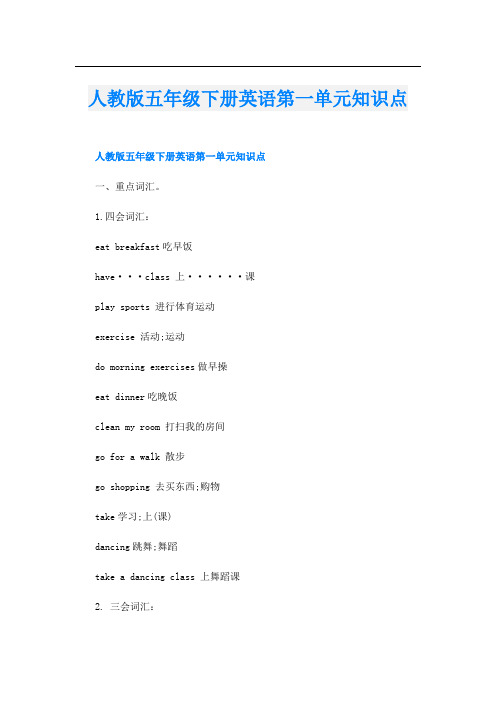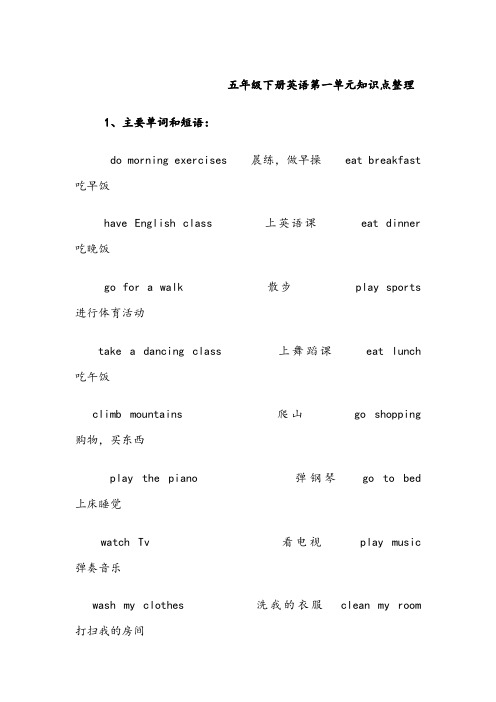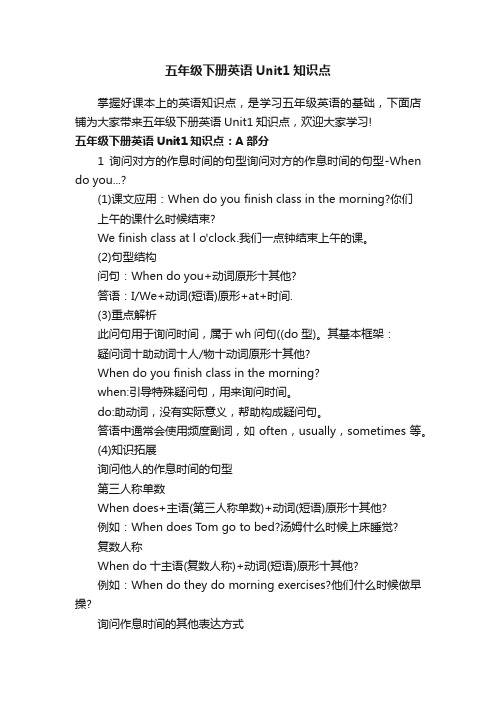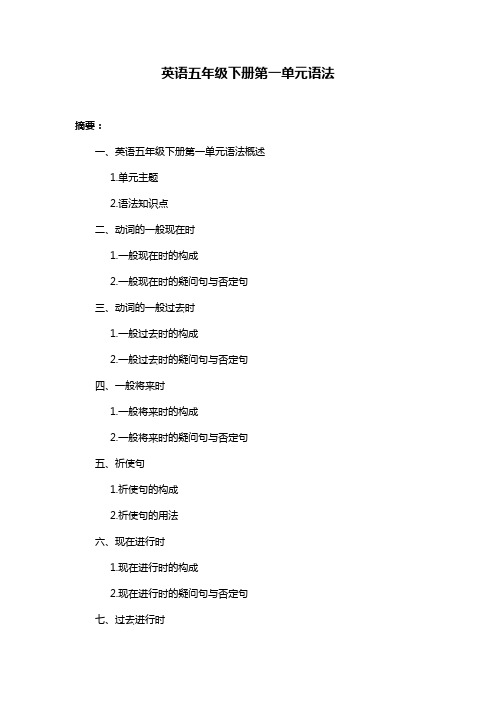五年级下册英语第一单元知识点整理
Unit1Myday(讲义)-人教PEP版英语五年级下册(1)

PEP英语五年级下册Unit 1 知识梳理【单元语音归纳】一、单词:eat breakfast[ˈbrekfəst]吃早餐 a.m上午have···class 上···课p.m 下午play sports 进行体育运动why 为什么exercise[ˈeksəsaɪz]活动;运动。
shop 去买东西;购物do morning exercises做早操work[wɜ:k] 工作eat dinner吃晚饭last [lɑ:st]上一个的;刚过去的clean my room 打扫我的房间sound[saʊnd] 听起来好像go for a walk 散步also[ˈɔ:lsəʊ] 还;也go shopping 去买东西;购物busy[ˈbɪzi] 忙的take学习;上(课)need[ni:d] 需要dancing[ˈdɑ:nsɪŋ] 舞蹈play 戏剧;剧本take a dancing class 上舞蹈课letter[ˈletə(r)] 信when 什么时候live[lɪv] 居住after 在(时间)后island[ˈaɪlənd] 岛start 开始always[ˈɔ:lweɪz] 总是;一直usually[ˈju:ʒuəli] 通常地cave[keɪv] 山洞Spain[speɪn] 西班牙go swimming 去游泳late[leɪt] 晚;迟win[wɪn] 获胜二、词语1. eat breakfast 吃早饭2. have…class 上……课3. play sports 进行体育活动4. exercise活动;运动5. do morning exercises 做早操6. eat dinner 吃晚饭7. clean my room 打扫我的房间8. go for a walk散步9. go shopping 去买东西;购物10. take 学习;上(课)11. dancing 跳舞;舞蹈12. take a dancing class 上舞蹈课13. go swimming去游泳【重点句型再现】1. 询问对方什么时间做某事的句型及答语—When do you finish class in the morning? 你们上午的课几点结束?—We finish class at 1 o’clock. 我们一点钟结束上午的课。
Unit1Myday基础知识(讲义)-人教PEP版英语五年级下册

班级: ____________ 姓名:____________五年级下册Unit1 基础知识一.句子“勇士闯两关”要求:读3遍以上后,闯第一关“看问句背答句”,再闯第二关“看答句背问句”问句答句1 When do you finish class ? I finish class at 11:05.At 7:00.2 When do you do morningexercises?3 When does she eat breakfast? She eats breakfast at 7:30.He has an English class at 9:00.4 When does he have an Englishclass?5 When do they play sports? They play sports at 3:00 p.m.I clean my room on the weekend.6 What do you do on theweekend?7 What do you do on Mondays? I take a dancing class on Mondays.He goes shopping on the weekend.8 What does he do on theweekend?9 What does she do on Tuesdays? She goes for a walk on Tuesdays.They play music on the weekend.10 What do they do on theweekend?11 Why are you shopping today? My mum worked last night.12 That sounds like a lot of fun. 听起来很有趣。
二.写出下列英文的中文意思。
做完请自己用红笔对照书本答案批改订正,然后背熟所有单词,至少要背熟5次,相信你可以做得很好哦,加油!吃早饭上...课进行体育运动做早操吃晚饭清洁我的房间去散步去购物上舞蹈课去跑步三.根据问句选出合适的答句,将序号填到前面括号里。
PEP五年级英语下册Unit1-6重点知识小结

Unit 1 This Is My Daydo morning exercises晨练eat breakfast吃早饭have english class上英语课play sports进行体育运动eat dinner吃晚饭when什么时候evening夜晚;晚上get up起床at在……点钟usually通常;一般noon中午climb mountains爬山go shopping购物;买东西play the piano弹钢琴visit grandparents看望祖父母go hiking去远足weekend周末often经常sometimes有时候话题1:日常生活时态:一般现在时1.When do you do morning exercises? 你什么时候做早操?I usually do morning exercises at 8:00. 我经常八点钟做早操。
(I usually get up at 12:00 at noon . 我经常在中午十二点起床。
) 2.When do you eat dinner ? 你什么时候吃晚餐?I eat dinner at 7:00 in the evening. 我在晚上七点种吃晚餐。
3.When is the best time to go to Beijing? Fall. 最好在什么时候去北京?秋天。
Unit 2 My Favourite Seasonspring春天summer夏天fall秋天winter冬天season季节which哪一个best最;极swim游泳fly kites放风筝skate滑冰make a snowman堆雪人plant trees种树why为什么because因为sleep 睡觉话题2:季节时态:一般现在时1.Which season do you like best ? I like spring best.(Spring.)你最喜欢是什么季节?我最喜欢春季。
(完整版)人教版五年级英语下册Unit1知识点汇总

Unit1 My day 知识整理△话题:谈论每天的活动及时间安排△词汇:do morning exercises(做早操)eat breakfast/lunch/dinner(吃早餐/午餐/晚餐)have...class(上…课),play sports(做运动)clean my room(打扫我的房间),go for a walk (散步) go shopping(购物),take a dancing class(上舞蹈课)△拓展词汇:get up(起床), go to bed(上床睡觉)wash my clothes(洗我的衣服), watch TV(看电视)do homework(做作业), play music(演奏音乐)cook dinner(煮晚餐), at home(在家)in the morning(在上午),in the afternoon(在下午)in the evening(在晚上),at night(在半夜)△句型:①询问做某事在几点When do you+动词原形(短语)+其他?—— At +时间—— I(+频度副词)+动词原形(短语)+at+时间。
例句:When do you get up in the morning?—— At 7:30.—— I often get up at 7:30.②询问周末的活动安排What do you often do on the weekend?I often (always/sometime/usually) +…(周末的活动)+with … (某人)+on the weekend (on Saturdays/on Sundays ).例句:What do you do on the weekend ?I often take a dancing class with my friend on Sundays. △知识点:1:注意介词的搭配at +具体时间(几点)/night/home at 9 o ’clock in +国家/季节 in Spainon +星期 on the weekend/on Sundays with +人 with my father/mother/friend 2:表示时间频率词的区别always 表示总是,一直;usually 表示经常,通常;often 表示经常,常常;sometimes 表示有时,间或。
五年级下册英语单词表第一单元

五年级下册英语单词表第一单元知识点总结一、单词及短语1. 名词- school:学校- classroom:教室- library:图书馆- playground:操场- office:办公室- teacher:教师- student:学生- book:书- desk:课桌- chair:椅子- door:门- window:窗户- blackboard:黑板2. 动词- have:有- go:去- read:阅读- write:写- draw:画- see:看见- learn:学习- teach:教3. 形容词- big:大的- small:小的- new:新的- old:旧的- clean:干净的- beautiful:美丽的4. 介词与副词- in:在……里- on:在……上- under:在……下- near:在……附近- also:也5. 短语- go to school:去上学- read a book:读书- write a story:写故事- draw a picture:画画- learn English:学习英语- clean the classroom:打扫教室二、重点句型1. 描述学校设施- This is our school. It has a big playground and a beautiful library.- Our classroom is clean and bright.2. 介绍日常活动- We go to school every day.- I like to read books in the library after school.3. 询问与回答- Where is the teacher's office? It's on the second floor.- Do you have a library? Yes, we do. / No, we don't.4. 表达喜好- I like our school very much. It's very beautiful.- My favorite place is the playground. I often play football there.三、语法点1. 可数名词与不可数名词- 可数名词通常有单数和复数形式,如book(单数),books(复数)。
人教版五年级下册英语第一单元知识点

人教版五年级下册英语第一单元知识点人教版五年级下册英语第一单元知识点一、重点词汇。
1.四会词汇:eat breakfast吃早饭have···class 上······课play sports 进行体育运动exercise 活动;运动do morning exercises做早操eat dinner吃晚饭clean my room 打扫我的房间go for a walk 散步go shopping 去买东西;购物take学习;上(课)dancing跳舞;舞蹈take a dancing class 上舞蹈课2. 三会词汇:when什么时候 after 在(时间)后 start 开始 usually 通常地;惯常地Spain 西班牙 late 晚;迟a.m. 午前;上午p.m. 午后;下午why 为什么 shop 去买东西;购物 work 工作last 上一个的;刚过去的sound 听起来好像also 还;也 busy 忙的 need 需要 play 戏剧;剧本letter 信 live居住 island 岛always 总是;一直 cave 山洞;洞穴go swimming 去游泳 win 获胜二、其他日常活动。
get up起床eat lunch吃午饭go to bed 上床睡觉wash my face洗脸wash my clothes 洗我的衣服watch TV看电视play ping-pong打乒乓球play the pipa弹琵琶go swimming去游泳go running去跑步do homework 做作业do kung fu练武术play football踢足球play basketball打篮球三、频度副词。
always总是,一直(100%) usually通常(80%) often 经常(60%) sometimes(30%)有时四、疑问词。
五年级英语下册1-4单元知识点汇总

五年级英语下册1-4单元知识点汇总**Unit 1: Our School****Vocabulary:*** classroom: 教室 * library: 图书馆 * playground: 操场* canteen: 食堂 * office: 办公室 * teacher's desk: 讲台 * computer room: 电脑室 * art room: 美术室 * music room: 音乐室**Sentences:*** This is our school. 这是我们的学校。
* Our school has a big playground. 我们的学校有一个大操场。
* We have many books in our library. 我们的图书馆里有很多书。
* The teachers work in the office. 老师们在办公室工作。
**Grammar:*** Use "has" or "have" to describe possession. 使用“has”或“have”来描述所属关系。
* Use "our" to refer to possession of the group. 使用“our”来指代群体的所属。
**Unit 2: My Family****Vocabulary:*** family: 家庭 * father: 父亲 * mother: 母亲 * brother: 兄弟 * sister: 姐妹 * grandparent: 祖父母 * uncle: 叔叔 * aunt: 阿姨**Sentences:*** This is my family. 这是我的家庭。
* I have a happy family. 我有一个幸福的家庭。
* My father is a doctor. 我的父亲是一名医生。
【知识学习】五年级英语下册第一单元单词及重点句型汇总

五年级英语下册第一单元单词及重点句型汇总Unit1wordList单词表cleanmyroom(打扫我的房间)domorningexercises(晨练)goforawalk(散步)eatbreakfast(吃早饭)takeadancingclass(上舞蹈课)goshopping(购物;买东西)haveEnglishclass(上英语课)eatdinner(吃晚饭)playsports(进行体育运动)when(什么时候)evening(夜晚;晚上)getup(起床)at(在……点钟)weekend(周末)always(总是,一直)often(经常)sometimes(有时候)usually(通常;一般)Unit1mainsentences主要句型.whendoyougetup?(你什么时候起床?)---Ioftengetupat7o’clock.(我经常在7点钟起床。
)2.whendoyoustartclassinSpain?(你在西班牙什么时候开始上课?)---Usuallyat9o’clock.(通常在9点钟。
)3.whatdoyoudoontheweekend?(你在周末做什么?)---IoftenwatchTVandplayping-pongwithmyfather.(我经常看电视,也常和我爸爸打乒乓球。
)4.Iusuallywashclothes.SometimesIcookdinner.(我经常洗衣服。
有时候我会做晚餐。
)5.Thatsoundslikealotoffun.(那样听起来很有趣。
)Unit1myday一、根据所给中文意思写单词。
______________________________________________________(打扫我的房间)(散步)(吃晚饭)______________________________________________________(上舞蹈课)(上英语课)(购物;买东西)______________________________________________________(吃早饭)(进行体育运动)(晨练)二、根据问句写答句。
五年级下册英语1到4单元知识点

五年级下册英语1到4单元知识点Unit 1: My DayIn this unit, students will learn how to talk about daily routines and use time expressions.Vocabulary:- Brush your teeth- Wash your face- Have breakfast- Go to school- Do homework- Go to bedCommon Phrases:- What time do you wake up?- I wake up at 7 o'clock.- What do you do in the morning?- I brush my teeth and wash my face.Grammar:- Present Simple Tense: Students will practice using the present simple tense to talk about daily routines.Unit 2: My FamilyIn this unit, students will learn how to introduce family members and describe their appearance and personality.Vocabulary:- Mother- Father- Sister- Brother- Grandmother- GrandfatherCommon Phrases:- Who is she?- She is my mother.- What does your father look like?- He is tall and has brown hair.Grammar:- Present Continuous Tense: Students will practice using the present continuous tense to describe what family members are doing.Unit 3: My SchoolIn this unit, students will learn how to describe their school, classroom, and school subjects.Vocabulary:- Classroom- Desk- Whiteboard- Library- Playground- Math- Science- ArtCommon Phrases:- Where is your classroom?- My classroom is on the second floor.- What is your favorite subject?- My favorite subject is art.Grammar:- Can / Can't: Students will practice using "can" and "can't" to talk about abilities and limitations.Unit 4: My HobbiesIn this unit, students will learn how to talk about their hobbies and interests.Vocabulary:- Play soccer- Draw- Dance- Sing- Swim- Play chessCommon Phrases:- What do you like to do in your free time?- I like to play soccer with my friends.- Do you enjoy painting?- Yes, I love to draw and paint.Grammar:- Present Simple Tense: Students will review the present simple tense to talk about hobbies and interests.。
五年级下册英语第一单元知识点整1

五年级下册英语第一单元知识点整理1、主要单词和短语:do morning exercises 晨练,做早操 eat breakfast吃早饭have English class 上英语课eat dinner 吃晚饭go for a walk 散步 play sports进行体育活动take a dancing class 上舞蹈课eat lunch 吃午饭climb mountains 爬山go shopping购物,买东西play the piano 弹钢琴go to bed 上床睡觉watch Tv 看电视play music 弹奏音乐wash my clothes 洗我的衣服clean my room 打扫我的房间on the weekend 在周末二、主要句子:When do you eat dinner 你什么时候吃晚饭I eat dinner at 7:00 in the evening. 我晚上七点吃晚饭。
When do you get up 你什么时候起床I usually get up at 12:00 at noon. 我通常在中午12点起床。
What do you do on the weekend 你在周末干什么Usually I watch TV and go shopping. 我通常看电视和购物。
Sometimes I visit my grandparents. 有时候我去看望我的外祖父母。
I often play football. 我经常踢足球。
Sometimes I go hiking. 有时候我去远足。
三、重要知识点表示频度的副词:always 总是,一直;usually 通常,常常;often 经常; sometimes 有时候频率副词通常用在主语之后动词之前有时放句首表强调Usually I watch TV and go shopping. 我通常看电视和购物。
五年级下册英语第一单元知识点

五年级下册英语第一单元知识点一、词汇部分1. Days of the week- Monday- Tuesday- Wednesday- Thursday- Friday- Saturday- Sunday2. Activities- Go to school- Have class- Play games- Do homework- Watch TV- Read books- Go shopping- Visit grandparents3. Adverbs of frequency- Always- Usually- Often- Sometimes- Rarely- Never二、句型部分1. What do you do on weekends?- I play games on weekends.- I do homework on weekends.2. What does he/she do on weekends?- He/She watches TV on weekends.- He/She visits grandparents on weekends.3. What do they do on weekends?- They go shopping on weekends.- They read books on weekends.4. Adverbs of frequency in sentences- I always play games with my friends.- She usually does her homework after school.- We often watch TV in the evening.- They sometimes go shopping on weekends.- He rarely reads books.- She never visits her grandparents.三、语法部分1. Present simple tense- Affirmative: I/You/We/They + base form of the verb- Negative: I/You/We/They + do not + base form of the verb - Question: Do + I/You/We/They + base form of the verb? - He/She/It: follows the base form of the verb with 's' or 'es'2. Using adverbs of frequency- Adverbs of frequency are placed before the main verb in a sentence.3. Days of the week- Capitalize the first letter of each day of the week.四、阅读部分1. Short passages about weekend activities- Readingprehension questions related to the passages- Describing one's own weekend activities2. Matching activities with the days of the week- Matching the correct activity with the corresponding day of the week- Describing the activities of each day3. Writing about one's own weekend activities- Describing the activities one does on weekends using adverbs of frequency- Using simple present tense to talk about weekend activities五、口语部分1. Role-playing conversations- Conversations about weekend activities- Practicing asking and answering questions about weekend activities2. Describing weekend activities- Speaking confidently and fluently about one's own weekend activities- Using appropriate adverbs of frequency in speech六、写作部分1. Writing sentences using adverbs of frequency- Writing sentences about one's own activities using adverbs of frequency- Describing the frequency of various activities2. Short paragraph writing about weekend activities- Writing a short paragraph about one's own weekend activities - Using simple present tense and adverbs of frequency in writing总结五年级下册英语第一单元知识点主要包括词汇、句型、语法、阅读、口语和写作部分。
五年级下册英语Unit1知识点

五年级下册英语Unit1知识点掌握好课本上的英语知识点,是学习五年级英语的基础,下面店铺为大家带来五年级下册英语Unit1知识点,欢迎大家学习!五年级下册英语Unit1知识点:A部分1询问对方的作息时间的句型询问对方的作息时间的句型-When do you...?(1)课文应用:When do you finish class in the morning?你们上午的课什么时候结束?We finish class at l o'clock.我们一点钟结束上午的课。
(2)句型结构问句:When do you+动词原形十其他?答语:I/We+动词(短语)原形+at+时间.(3)重点解析此问句用于询问时间,属于wh问句((do型)。
其基本框架:疑问词十助动词十人/物十动词原形十其他?When do you finish class in the morning?when:引导特殊疑问句,用来询问时间。
do:助动词,没有实际意义,帮助构成疑问句。
答语中通常会使用频度副词,如often,usually,sometimes等。
(4)知识拓展询问他人的作息时间的句型第三人称单数When does+主语(第三人称单数)+动词(短语)原形十其他?例如:When does Tom go to bed?汤姆什么时候上床睡觉?复数人称When do十主语(复数人称)+动词(短语)原形十其他?例如:When do they do morning exercises?他们什么时候做早操?询问作息时间的其他表达方式询问作息时间还可以用“What time do/does+主语十动词(短语)原形十其他?”句型。
例如:what time do you get up?你什么时候起床?2字母组合cl,pl在单词中的发音字母组合cl,pl在单词中的发音五年级下册英语Unit1知识点:B部分1询问对方周末做什么的句型询问对方周末做什么的句型-What do you do on the weekend?(1)课文应用:So What do you do on the weekend?那么你周末做什么?I often watch TV and play ping-pong with my father.我经常看电视、和我爸爸一起打乒乓球。
五年级下册英语第一单元Unit1知识点总结

五四青年节01短语go toBeijing 去北京at the train station 在火车站want to 想要sit down 坐下stand up 起立go straight 直走ride bike 骑车look out of 向外看on the train在火车look at 看见draw a picture 画画read a book读书sing a song 唱歌have breakfast吃早点fly a kite 放风筝here you are 给你read thenewspaper 读报havefun 玩得高兴play with 跟…玩play cards 打牌go on atrip to Beijing去北京旅行get the tickets 买票how much 多少钱have a good trip一次美妙的旅行listen to music 听音乐02句子1.Please don‘t jump!不要跳2.A:What are you doing ?你在干什么?B:I’mreading a book.我正在读书。
3.A:Who is singing ?谁在唱歌?B:Thegirl is singing。
这个女孩在唱歌。
4.A:Who is hungry ?谁饿了?B:I’mhungry.我饿了。
5.A:Would you like some fruit? 你想要点水果吗?B:Yes,please/No,thanks.6.A:What would you like? 你想要点什么?B:I’d like some candy.我想要点糖果。
7. A:What is the baby doing ?这个婴儿在干什么?B:The baby is crying.这个婴儿在哭。
03语法1.完全形式don’t -do not 、I'm-I am、isn't-is not、can't-can not2.单三run-runs 、say-says3.there同音词their look看的动作see看的结果4.现在分词:do-doing、look-looking、draw-drawing、sing-singing、sit-sitting、play-playing、talk-talking 、sleep-sleeping、have-having、drive-driving5.反义词:ask-answer、man-woman、sit down-stand up、tall-short、these-those6.Please don't +动词原形请不要做(祈使句否定形式)7.主语+am/is/are+ 现在分词现在进行时(正在做……)一般疑问句:Am/Is/Are 主语+现在分词?。
英语五年级下册第一单元语法

英语五年级下册第一单元语法摘要:一、英语五年级下册第一单元语法概述1.单元主题2.语法知识点二、动词的一般现在时1.一般现在时的构成2.一般现在时的疑问句与否定句三、动词的一般过去时1.一般过去时的构成2.一般过去时的疑问句与否定句四、一般将来时1.一般将来时的构成2.一般将来时的疑问句与否定句五、祈使句1.祈使句的构成2.祈使句的用法六、现在进行时1.现在进行时的构成2.现在进行时的疑问句与否定句七、过去进行时1.过去进行时的构成2.过去进行时的疑问句与否定句八、现在完成时1.现在完成时的构成2.现在完成时的疑问句与否定句九、过去完成时1.过去完成时的构成2.过去完成时的疑问句与否定句十、现在完成进行时1.现在完成进行时的构成2.现在完成进行时的疑问句与否定句正文:英语五年级下册第一单元语法主要围绕动词的各种时态展开,包括一般现在时、一般过去时、一般将来时、祈使句、现在进行时、过去进行时、现在完成时、过去完成时、现在完成进行时。
首先,我们来了解动词的一般现在时。
一般现在时的构成是动词原形,例如:I study English every day.一般现在时的疑问句是在动词后加“?”号,否定句是在动词前加“don"t”,例如:Do you study English every day? I don"t study English every day.其次,动词的一般过去时表示过去某个时间里发生的动作或存在的状态。
一般过去时的构成是动词过去式,例如:I studied English yesterday.一般过去时的疑问句是在动词后加“?”号,否定句是在动词前加“didn"t”,例如:Did you study English yesterday? I didn"t study English yesterday.一般将来时表示将来某个时间里要发生的动作或存在的状态。
小学英语五年级下册第一单元知识总结

高层住宅建筑立面设计探析在城市的天际线上,高层住宅建筑如同挺拔的巨人,它们的立面设计不仅影响着建筑的外观美感,还与居住者的生活品质、城市的整体形象息息相关。
高层住宅建筑立面设计是一个综合性的课题,需要考虑诸多因素,如功能需求、美学原则、地域文化、材料技术等。
本文将对高层住宅建筑立面设计进行深入探析,以期为相关设计实践提供有益的参考。
一、高层住宅建筑立面设计的重要性高层住宅建筑的立面是其外在形象的直接展现,具有多方面的重要意义。
首先,良好的立面设计能够提升建筑的美学价值。
在现代城市中,人们对于建筑的审美要求越来越高,一个具有独特风格和魅力的立面可以成为城市景观的亮点,为城市增添艺术氛围。
其次,它有助于改善居住环境。
合理的立面设计可以控制采光、通风,减少噪音和热量的传递,提高居住的舒适度。
再者,立面设计能够反映建筑的功能和品质。
例如,通过立面的处理可以展现住宅的高端定位或者经济适用的特点。
最后,对于城市而言,统一协调而又富有变化的高层住宅建筑立面能够塑造城市的独特风貌,增强城市的可识别性和吸引力。
二、影响高层住宅建筑立面设计的因素(一)功能需求功能是立面设计的基础。
建筑的采光、通风、遮阳等需求都需要在立面设计中得到体现。
例如,大面积的窗户可以增加采光,但同时需要考虑遮阳措施以避免夏季过热。
阳台和露台的设置不仅可以提供户外活动空间,也会影响立面的外观和比例。
(二)美学原则美学原则在立面设计中起着关键作用。
比例与尺度的把握要恰到好处,使建筑在视觉上给人以和谐、稳定的感觉。
对称与均衡的运用可以营造出庄重、整齐的效果,而不对称和动态的设计则能展现出活泼与创新。
色彩的搭配要考虑与周围环境的协调以及对居住者心理的影响,暖色调可以给人温馨的感觉,冷色调则显得宁静。
(三)地域文化不同的地域有着独特的文化传统和建筑风格。
在高层住宅建筑立面设计中融入地域文化元素,可以使建筑更好地融入当地环境,传承和弘扬地域特色。
比如,在南方一些地区,建筑立面可能会采用轻盈通透的设计以适应炎热潮湿的气候;而在北方,可能更注重保温和防风的处理。
英语五年级下册第一单元语法

英语五年级下册第一单元语法以下是英语五年级下册第一单元的语法知识点:1. 现在进行时:表示正在进行的动作或正在发生的事情。
结构:be动词(am/is/are)+动词ing例子:I am playing football.(我正在踢足球。
)2. 动词ing形式:表示正在进行的动作,常与be动词一起使用。
结构:动词+ing例子:running(跑)3. 特殊疑问句:用来对某一事物或情况进行提问。
结构:特殊疑问词+be动词/助动词+主语+动词ing例子:What are you doing?(你正在做什么?)4. 祈使句:表示请求、命令或建议。
结构:动词原形+宾语+其他成分例子:Please help me.(请帮我。
)5. 形容词的比较级和最高级:表示两个或多个事物之间的比较关系。
结构:形容词比较级+than+比较对象形容词最高级+of/in+范围例子:This book is more interesting than that one.(这本书比那本书更有趣。
)The most beautiful place in the world is the Amazon rainforest.(世界上最美丽的地方是亚马逊雨林。
)6. 序数词:表示事物的顺序。
结构:基数词+序数词后缀例子:the first day(第一天)7. 时间表达法:表示具体的时间。
结构:小时+分钟/秒钟例子:at 3:15(在3点15分)8. 介词:表示事物之间的位置关系。
结构:介词+名词/代词例子:in the morning(在早上)9. 副词:修饰动词、形容词或整个句子,表示动作的方式、程度或时间等。
结构:副词+动词/形容词/句子例子:beautifully(漂亮地)。
五年级英语下册知识点归纳总结-五下知识点总结

五年级英语下册知识点归纳总结-五下知识点总结五年级英语下册共分为8个单元,本文将对每个单元的重点知识进行总结概括。
Unit 1:We Love Sports- 研究运动名称及其所属类别,如ball games、water sports等。
- 能够听、说、读、写运动项目的名称,并掌握其发音。
Unit 2:Sea Animals- 掌握海洋动物的基本词汇,如dolphin、shark、octopus等。
- 研究描述海洋动物的形态及特征的基本语句,如It has long legs.等。
- 了解海洋保护的重要性,关注保护海洋的行动。
Unit 3:At the Theme Park- 研究主题公园中的各种游乐设施的名称,如roller coaster、ferris wheel等。
- 掌握询问游乐园内设施及其位置的基本表达,如Where is the roller coaster?等。
Unit 4:Nature and Weather- 掌握四季和不同天气的基本英文表达,如It's snowing.等。
- 能够描述天气和季节的变化情况,如Winter is cold.等。
Unit 5:Food And Drinks- 研究食物和饮料的名称及其分类,如vegetables、fruit、juice 等。
- 能够描述食物的口味和自己的饮食惯,如I like sweet food.等。
- 了解健康饮食的基本知识,学会选择健康食品。
Unit 6:Occupations- 掌握各种职业的名称,并了解其特点和职责,如doctor、teacher、policeman等。
- 能够描述自己理想的职业,如What do you want to be?等。
Unit 7:Let's Travel- 研究旅游景点的名称,如the Great Wall、the Summer Palace 等。
- 掌握询问和描述旅游线路和景点的基本表达,如Which city do you want to visit?等。
五年级下册英语Unit1 My day知识点总结复习及练习(含答案) 人教PEP

Unit1 My day知识速递1.重点单词和短语eat breakfast: 吃早饭have…class: 上……课play sports: 进行体育运动exercise: /'eksəsaɪz/ 活动;运动do morning exercise: 做早操eat dinner: 吃晚饭clean my room: 打扫我的房间go for a walk: 散步go shopping: 去买东西;购物take: /teɪk/ 学习;上(课)dancing: /'dɑːnsɪŋ/ 跳舞;舞蹈take a dancing class: 上舞蹈课when: /wen/ 什么时候;何时after: /'ɑːftə/ 在(时间)后start: /stɑːt/ 开始usually: /'juʒuəli/ 通常地;惯常地why: /waɪ/ 为什么always: /'ɔːlweɪz/ 总是;一直busy: /'bɪzɪ/ 忙的need: /niːd/ 需要go swimming: 去游泳win: /wɪn/ 获胜2.语法回顾a. 重点单词:eat breakfast, have…class, play sports, exercise, do morning exercise, eat dinner, clean my room, go for a walk, go shopping, take a dancing class, when, usually, why, always, go swimming, win, need.b. 询问何时做某事:When do you……?例:①When do you get up? (你什么时候起床?)②When do you do morning exercises? (你们什么时候做早操?)③When do they go to school? (他们什么时候去上学?)拓展:When does she eat breakfast?练一练:( ) —When______ you do morning exercises?A. doesB. doC. are( ) —When______ she go to bed?A. doesB. doC. arec. 询问他人周末做什么:What do you do on the weekend?例:①What do you do on the weekend? (你周末做什么?)②What does she do on the weekend? (她周末做什么?)回答:①I usually clean my room. (我通常打扫房间。
五年级下册英语第一单元整理归纳

精品文档五年级(下)Unit 11.单词:run 跑sorry 对不起,不好意思(道歉时用)jump 跳;跳跃sing 唱;演唱dance 跳舞sit 坐down 向下;朝下;沿着stand 站立;直立up 向上;在上面see 看见;明白;会见(过去式为saw)boy 男孩(复数boys)girl(复数girls) 女孩now 现在draw 画picture 图画;图片woman 女人(复数women) talk 交谈;讨论baby 婴儿(复数babies) cry 哭;哭泣;喊叫who 谁sleep 睡觉;入睡man 男人(复数men) hungry 饥饿的water 水tea茶(some tea 一些茶) candy 糖果(some candy一些糖果)train(火车)tree树(复数trees) window 窗户banana香蕉(复数bananas 一根香蕉a banana) dumpling饺子(通常使用的都是其复数形式dumplings)behind 在….之后tired 疲劳的,累的fruit水果(some fruit 一些水果) water 水(some water 一些水)swim游泳happy 高兴的sad 伤心的newspaper报纸paper纸card 卡片,纸牌(复数cards)find 发现,找到2.短语:go straight 直行turn left 左转turn right 右转ride a bike 骑自行车sit down坐下起立stand up站起来look at 看(某人或某物)look out of 从….向外看read the newspaper看报纸read a book /read books看书draw a picture /draw pictures 画画sing a song /sing songs 唱歌play football 踢足球play basketball 打篮球play ping-pong 打乒乓球play cards打扑克(with和…) watch TV看电视do my homework做作业have breakfast吃早餐have lunch吃午餐have dinner 吃晚餐take a picture / take pictures照相fly a kite / fly kites放风筝look out of the window 向窗户外面看wash my face 洗脸wash my hands 洗手make my bed 叠被子,整理床铺句子:3.祈使句:(祈使句是用来表达命令、请求、劝告、警告、禁止等的句子。
- 1、下载文档前请自行甄别文档内容的完整性,平台不提供额外的编辑、内容补充、找答案等附加服务。
- 2、"仅部分预览"的文档,不可在线预览部分如存在完整性等问题,可反馈申请退款(可完整预览的文档不适用该条件!)。
- 3、如文档侵犯您的权益,请联系客服反馈,我们会尽快为您处理(人工客服工作时间:9:00-18:30)。
五年级下册英语第一单元知识点整理
1、主要单词和短语:
domorningexercises
晨练,做早操
eatbreakfast
吃早饭
haveEnglishclass
上英语课
eatdinner
吃晚饭
playsports
进行体育活动
eatlunch
吃午饭
climbmountains
爬山
goshopping
购物,买东西
playthepiano
弹钢琴
visitgrandparents
看望(外)祖父母
gohiking
去远足
二、主要句子:whendoyoueatdinner?
你什么时候吃晚饭?
Ieatdinnerat7:00intheevening. 我晚上七点吃晚饭。
whendoyougetup?
你什么时候起床?
Iusuallygetupat12:00atnoon.
我通常在中午12点起床。
whatdoyoudoontheweekend?
你在周末干什么?UsuallyIwatchTVandgoshopping. 我通常看电视和购物。
SometimesIvisitmygrandparents. 有时候我去看望我的外祖父母。
Ioftenplayfootball.
我经常踢足球。
SometimesIgohiking.
有时候我去远足。
三、重要知识点
同义词:
eatbreakfast-havebreakfast,
eatlunch-havelunch,
eatdinner-havedinner playsports-dosports,
usually-often
复数形式:policeman-policemen
policewoman-policewomen
现在分词:tell-telling
第三人称单数:say-says
同义句:whatdoyoudo?---whatareyou?你是干什么的?
表示频度的副词:always总是,一直;usually通常,常常;often经常;sometimes有时候
以复数形式出现的词组:visitgrandparents,planttrees
介词后跟表示时间的词语时,表示在某年、某月、某个季节,某个时候(在上午,在下午,在晚上)用in;表示在某一天,在星期几用on,在具体的几点几分用at.
too和either的用法区别:too和either都是“也”的意思,但too用于肯定句,either用于否定句。
